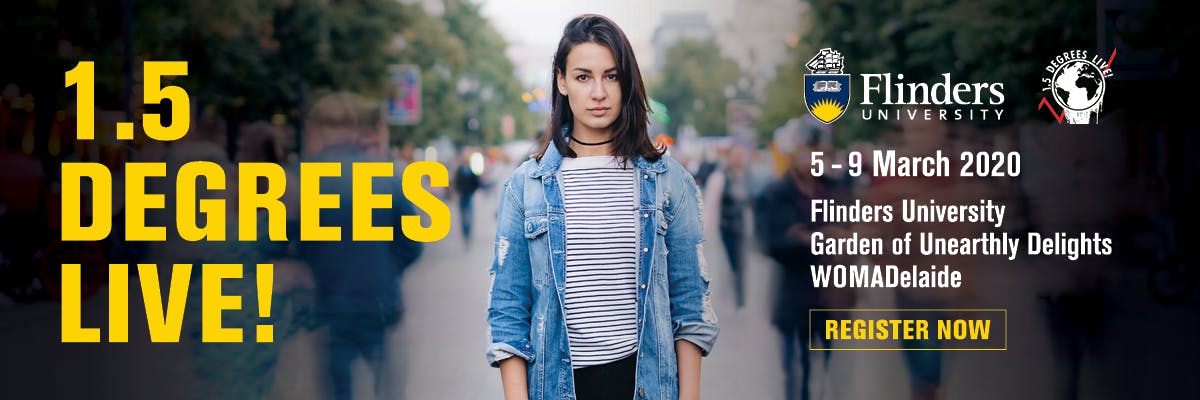FAQs
What is all this about?
Flinders University is presenting a multi-day event called "1.5 Degrees Live" in Adelaide, Australia from March 5 - 9, 2020.
The original 1.5 Degrees Live! was a 50-hour reading of the full 2018 Intergovernmental Panel on Climate Change (IPCC) Special Report on 1.5 degrees of Global Warming at the Edinburgh Fringe in 2018. It was read by 141 performers, authors, directors, acrobats, scientists, politicians, comedians, and members of the public for 20-30 minutes each.
Hundreds of community members and business share an ambition to make the City of Adelaide a carbon neutral city.
This YourSay Page was created to let people know about the event in Adelaide, and to assist in inviting others to attend.
It also contains link to learn about the Council's actions to reduce emissions, and the city’s ambition to transition to a low carbon economy, to keep you informed of our progress.
Can anyone attend?
Yes, the event is free and open to the public on Thursday 5 March (Flinders University), Friday 6 March, and Saturday 7 March (Garden of Unearthly Delights).
On Sunday 8 March and Monday 9 March the reading will be located in WOMADelaide, accessible to ticket holders.
Each reading will for around 20 minutes but you are free to come and go as you like.
See more and register to attend
https://www.flinders.edu.au/engage/culture/whats-on/degrees-live
Can I put this in a newsletter/ share with others?
What is the Intergovernmental Panel on Climate Change?
The Intergovernmental Panel on Climate Change (IPCC) is the United Nations body for assessing the science related to climate change.
The IPCC provides regular assessments of the scientific basis of climate change, its impacts and future risks, and options for adaptation and mitigation.
Created in 1988 by the World Meteorological Organization (WMO) and the United Nations Environment Programme (UNEP), the objective of the IPCC is to provide governments at all levels with scientific information that they can use to develop climate policies. IPCC reports are also a key input into international climate change negotiations.
The IPCC is an organization of governments that are members of the United Nations or WMO. The IPCC currently has 195 members. Thousands of people from all over the world contribute to the work of the IPCC. For the assessment reports, IPCC scientists volunteer their time to assess the thousands of scientific papers published each year to provide a comprehensive summary of what is known about the drivers of climate change, its impacts and future risks, and how adaptation and mitigation can reduce those risks.
An open and transparent review by experts and governments around the world is an essential part of the IPCC process, to ensure an objective and complete assessment and to reflect a diverse range of views and expertise. Through its assessments, the IPCC identifies the strength of scientific agreement in different areas and indicates where further research is needed. The IPCC does not conduct its own research.
Text from: https://www.ipcc.ch/about/
Is the text exactly the same as in the IPCC report?
The report was modified as little as possible to allow it to be read aloud. Modifications included:
In-text scientific references and bracketed references to other chapters were removed to enable smooth reading.
Acronyms were replaced with the full form, so that people could more easily grasp the meaning.
Before each section the creators added some context – making it clear to everyone that these were additional words not the IPCC’s.
These sections explain what people were about to hear and what its place was within the report. The modified report took a team of 9 people approximately 400 hours.
The script has now been made available as open source to anyone in the world to stage a reading.
What is the City of Adelaide doing to respond to climate change ?
See an overview of they City's response to action on climate change
Read about the City of Adelaide's emissions reductions
Read about Carbon Neutral Adelaide - a shared ambition for a carbon neutral city.


